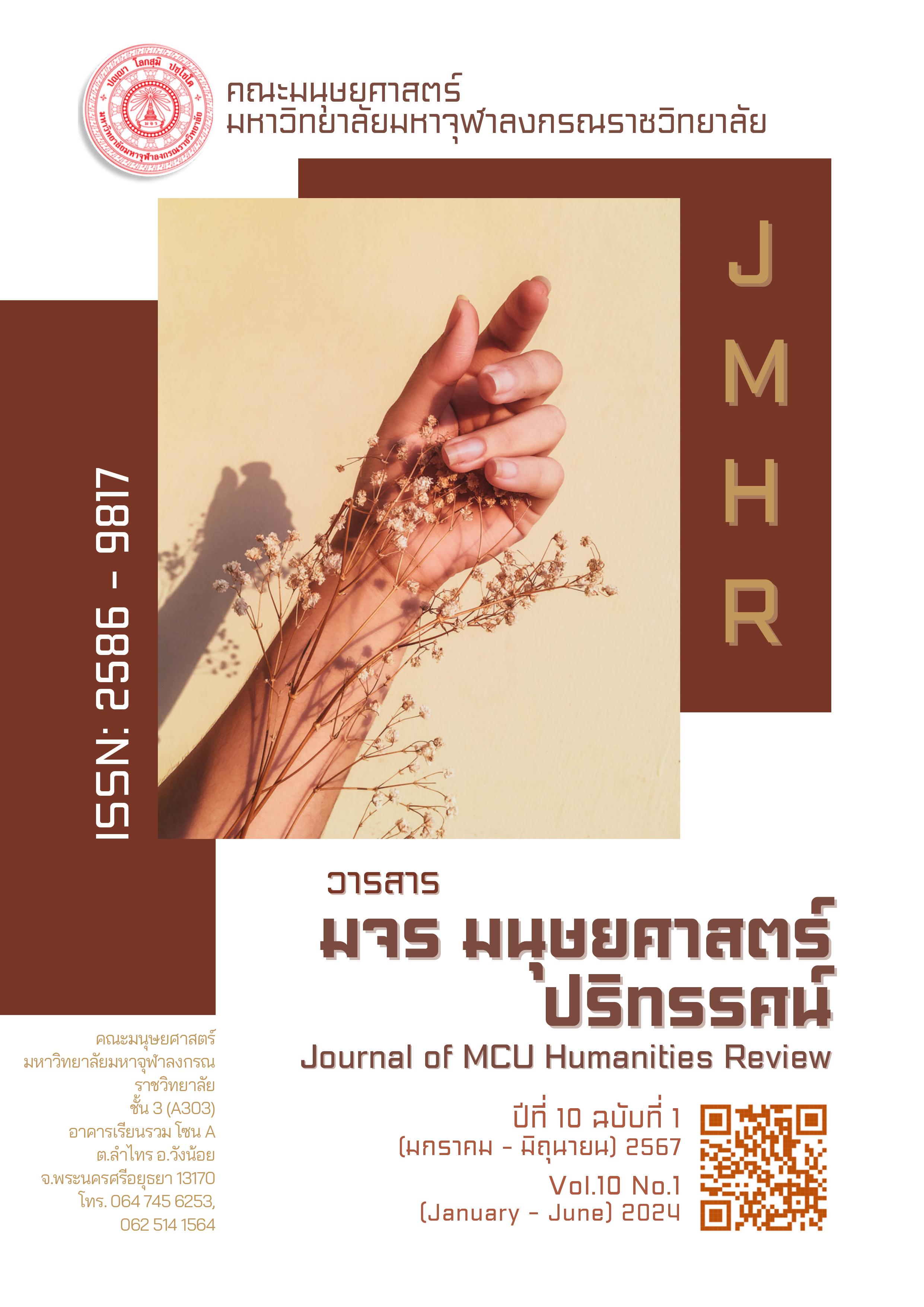การพัฒนาตัวบ่งชี้ภูมิคุ้มกันทางใจเพื่อเสริมสร้างทักษะชีวิตวิถีใหม่ตามแนวพุทธจิตวิทยาสำหรับเยาวชนในสังคมไทย
คำสำคัญ:
พุทธจิตวิทยา, ภูมิคุ้มกันทางใจ, เยาวชน, ทักษะวิถีชีวิตใหม่บทคัดย่อ
งานวิจัยนี้มีวัตถุประสงค์ 1. เพื่อศึกษาแนวคิด ทฤษฎีภูมิคุ้มกันทางใจเพื่อเสริมสร้างทักษะชีวิตวิถีใหม่ตามแนวพุทธจิตวิทยาสำหรับเยาวชนในสังคมไทย 2. เพื่อพัฒนาตัวบ่งชี้ภูมิคุ้มกันทางใจเพื่อเสริมสร้างทักษะชีวิตวิถีใหม่ตามแนวพุทธจิตวิทยาสำหรับเยาวชนในสังคมไทย 3. เพื่อตรวจสอบความสอดคล้องของโมเดลตัวบ่งชี้ภูมิคุ้มกันทางใจเพื่อเสริมสร้างทักษะชีวิตวิถีใหม่ตามแนวพุทธจิตวิทยาสำหรับเยาวชนในสังคมไทยกับข้อมูลเชิงประจักษ์ ใช้วิธีวิจัยผสานวิธี (Mixed Methods) 3 ระยะ โดยระยะที่ 1 การวิจัยเชิงคุณภาพโดยการศึกษาเอกสารที่เกี่ยวข้อง ระยะที่ 2 การวิจัยเชิงคุณภาพโดยการสัมภาษณ์เชิงลึก เก็บข้อมูลจากผู้ให้ข้อมูลสำคัญ 17 คน ระยะที่ 3 การวิจัยเชิงปริมาณโดยเก็บข้อมูลแบบสอบถามจากกลุ่มตัวอย่าง จำนวน 538 คน เครื่องมือที่ใช้ ได้แก่ แบบสัมภาษณ์เชิงลึก แบบวัดภูมิคุ้มกันทางใจและทักษะชีวิต วิเคราะห์ข้อมูลเชิงคุณภาพด้วยเทคนิคสามเส้า (Triangulation) และ QDAT Knowledge (6’C : Quality Data Analysis Technic) วิเคราะห์ข้อมูลเชิงปริมาณด้วยสถิติบรรยายและการตรวจสอบความตรงของโมเดลความสัมพันธ์เชิงสาเหตุ โดยใช้โปรแกรมลิสเรล (Lisrel)
ผลการวิจัยพบว่า 1. คุณลักษณะของเยาวชนที่มีทักษะชีวิตมี 5 ประการคือ มีทักษะการคิด มีทักษะการจัดการอารมณ์ มีทักษะการสร้างสัมพันธภาพและการสื่อสาร มีทักษะการแก้ปัญหา และตระหนักรู้และเห็นคุณค่าของตนและผู้อื่น 2. รูปแบบที่พัฒนาขึ้นเป็นโมเดลความสัมพันธ์เชิงสาเหตุการพัฒนาตัวบ่งชี้ภูมิคุ้มกันทางใจเพื่อเสริมสร้างทักษะชีวิตวิถีใหม่ตามแนวพุทธจิตวิทยาสำหรับเยาวชนในสังคมไทย มีองค์ประกอบที่เป็นปัจจัยสำคัญและมีความสัมพันธ์เชิงสาเหตุและผลที่จะนําไปสู่การมีทักษะชีวิตวิถีใหม่ตามแนวพุทธจิตวิทยาสำหรับเยาวชนในสังคมไทย ประกอบด้วย 1) คุณลักษณะของเยาวชนที่มีภูมิคุ้มกันทางใจ 2) ปัจจัยภายใน และ 3) ปัจจัยโมเดลความสัมพันธ์เชิงสาเหตุการพัฒนาตัวบ่งชี้ภูมิคุ้มกันทางใจเพื่อเสริมสร้างทักษะชีวิตวิถีใหม่ตามแนวพุทธจิตวิทยาสำหรับเยาวชนในสังคมไทยมีความสอดคล้องกลมกลืนกับข้อมูลเชิงประจักษ์ (Chi-square = 104.06, df = 84, p = .068, GFI = .978, AGFI =.959, RMR =.2783) อธิบายความแปรปรวนของการมีทักษะชีวิตวิถีใหม่ตามแนวพุทธจิตวิทยาสำหรับเยาวชนในสังคมไทย ได้ร้อยละ 88.00 และปัจจัยภายใน ได้ร้อยละ 50.00 แสดงว่า คุณลักษณะของวัยรุ่นที่มีภูมิคุ้มกันทางใจและปัจจัยภายใน สามารถส่งเสริมให้เกิดการมีทักษะชีวิตวิถีใหม่ตามแนวพุทธจิตวิทยาสำหรับเยาวชนในสังคมไทย
เอกสารอ้างอิง
พระครูวินัยธรศิริเวษฐ์ สิริวฑฺฒโน. (2564). การพัฒนาจิตใจมนุษย์ด้วยหลักธรรมทางพระพุทธศาสนา. วารสารมหาจุฬานาครทรรศน์, 8(7), 78-89.
ทิพย์สุดา โกยวาณิชย์ และคณะ. (2556). ผลของการปรึกษากลุ่มตามหลักโยนิโสมนสิการเพื่อพัฒนาพฤติกรรมการบริโภคด้วยปัญญาของวัยรุ่น. วารสารศึกษาศาสตร์, 24(2), 47–61.
ปริญญา ชะอินวงษ์. (2563). การถูกรังแกผ่านโลกไซเบอร์และความเสี่ยงต่อการฆ่าตัวตายในเยาวชน. วารสารการพยาบาลจิตเวชและสุขภาพจิต, 34(3), 133.
รุ่งลาวัลย์ ละอำคา. (2557). ทักษะชีวิตของเด็กปฐมวัย : แก่นแห่งชีวิตที่เสริมสร้างได้จากครอบครัว. วารสารเพื่อพัฒนาสังคมและชุมชน มหาวิทยาลัยมหาสารคาม, 1(2), 33-44.
สมเด็จพระพุทธโฆษาจารย์ (ป. อ. ปยุตฺโต). (2563). พุทธธรรม (ฉบับปรับขยาย) พิมพ์ครั้งที่ 54. กรุงเทพฯ: สํานักพิมพ์ผลิธัมม์.
“________”. (2021). การเพิ่มประสิทธิภาพในการทำงาน. สืบค้นเมื่อ 20 พฤศจิกายน 2566, จาก https://www.watnyanaves.net/en/book-reading/27/2
Angela Duckworth. (2016). Grit: The Power of passion and Perseverance. New York: An Imprint of Simon & Schuster Inc.
Christopher J. Mruk. (2006). Self-esteem Research, Theory, and Practice: Toward a Positive Psychology of Self-Esteem, 3rd Edition. New York: Maple-Vail Book Manufacturing.
Edith Henderson Grotberg. (2003). Resilience for Today. Retrieved 4 May 2021, from http://resilent.uluc.edu/library/grotberg2005_resilience-for-tommorrow-brazil.pdf
Stanley Coopersmith. (1981). The antecedents of self-esteem. Palo Alto, CA: Consulting Psychologists Press.
ดาวน์โหลด
เผยแพร่แล้ว
รูปแบบการอ้างอิง
ฉบับ
ประเภทบทความ
หมวดหมู่
สัญญาอนุญาต
ลิขสิทธิ์ (c) 2024 วารสาร มจร มนุษยศาสตร์ปริทรรศน์

อนุญาตภายใต้เงื่อนไข Creative Commons Attribution-NonCommercial-NoDerivatives 4.0 International License.






